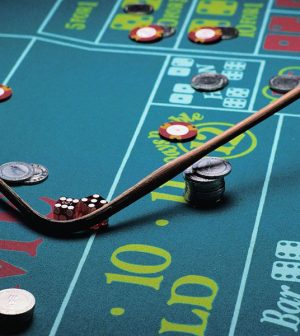- Could Your Grocery Store Meat Be Causing Recurring UTIs?
- Are You Making This Expensive Thermostat Error This Winter?
- Recognizing the Signs of Hypothyroidism
- 10 Strategies to Overcome Insomnia
- Could Artificial Sweeteners Be Aging the Brain Faster?
- Techniques for Soothing Your Nervous System
- Does the Water in Your House Smell Funny? Here’s Why
- Can a Daily Dose of Apple Cider Vinegar Actually Aid Weight Loss?
- 6 Health Beverages That Can Actually Spike Your Blood Sugar
- Treatment Options for Social Anxiety Disorder
Gambling: When Does Play Become Addiction?

While some gamble socially and others do it for a living, it’s a serious addiction for those who have an uncontrollable urge to keep going at the risk of losing everything.
“In our brain, the centers involved with gambling addiction are the same centers involved with substance addiction,” said Dr. Asim Shah, professor and executive vice chair of psychiatry and behavioral sciences at Baylor College of Medicine in Houston.
“The warning signs can be the same as any addiction,” he said in a college news release.
Gambling stimulates the brain’s reward center, resulting in a rush that makes someone want to keep doing it.
Shah said there are three types of gamblers.
While skilled professional gamblers demonstrate self-control, patience and rational thinking, problem gamblers are compulsive, rely on the habit for their livelihood and have no self-control around it.
A social gambler, meanwhile, spends a moderate amount of time and money in casinos or enjoys occasionally making bets.
While problem gamblers may think they fit in one of these other categories, there are warning signs of gambling addiction. They may feel helpless or hopeless, become restless or edgy. A problem gambler may max out their credit cards to feed this behavior.
A problem gambler may also bet more to recover money lost, lie to hide the problem or have others suggesting they should cut back.
Gambling has four phases, Shah said. There’s winning, losing, desperation and hopelessness.
Gamblers start feeling euphoric after winning and spend more money to feel that rush again.
After eventually losing, they feel desperation and continue to gamble to try to recover the losses, Shah said.
After repeatedly losing, the gambler may feel a sense of hopelessness. It’s a vicious cycle.
The addiction can lead to losing a home, family, job and all belongings. It may lead to substance use, relationship problems and depression.
“People can end up losing everything they have. It’s not easy to change the habit,” Shah said.
If a loved one shows signs of gambling addiction, take him or her to a professional who specializes in this addiction. Gambling prevention centers and self-help groups may also be helpful.
Some medications that treat obsessive compulsiveness can be used to treat gambling addiction, according to Baylor experts.
More information
The American Psychiatric Association has more on gambling disorder.
SOURCE: Baylor College of Medicine, news release, March 22, 2023
Source: HealthDay
Copyright © 2026 HealthDay. All rights reserved.










